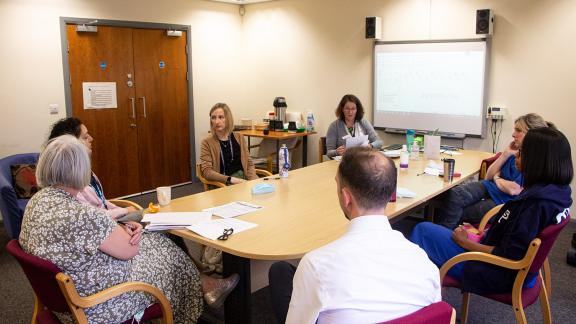Embracing staff feedback to embed cultural change

Overview
Liverpool Women's NHS Foundation Trust is a specialist hospital trust in the North West employing more than 1,500 staff. The trust historically didn’t score well in the NHS Staff Survey, compared with other specialist organisations, and saw a decline in staff engagement scores in 2020 and 2021.
The trust recognised it needed to try a new approach, so set about developing a comprehensive strategy to improve staff and patient experience, boost staff engagement and improve its survey scores.
Key benefits and outcomes
- The trust made significant improvements in all key themes in the 2022 NHS Staff Survey.
- It was ranked in the top ten most improved trusts nationally in 2022.
- It was also the joint most improved trust on staff engagement indicators.
- Liverpool Women’s also raised its employee response rate to one of the highest in the survey.
What the organisation faced
Staff survey results in 2020 showed employees at Liverpool Women’s would not recommend it as a place to work. Staff reported not feeling involved in decisions, and the engagement scores were the lowest of any specialist trust. It had lower than average scores on most People Promise indicators and one of the lowest scores on health and wellbeing and raising concerns.
What the organisation did
A new role of head of culture and staff experience was recruited in 2021. This role was supported by trade unions, the staff side chair and deputy director of workforce to develop and implement a new approach. The trust is committed to this partnership working with unions and the local staff side.
The approach focused on changing organisational culture to one that is fair and just, and improving engagement and communication so staff can raise concerns and share their experiences, knowing the trust would learn and take action to become a better place to work. An inclusive, kind and compassionate culture was instilled, where all people are valued and encouraged to contribute.
Staff engagement initiatives
The trust developed a comprehensive range of measures to move to a process of ongoing feedback rather than a traditional reactive model. New initiatives include:
- Twice-yearly big conversations – big conversation events are carried out over two days with site walkabouts to speak to a range of staff in their own work areas. It received mixed feedback initially, but staff do welcome the opportunity to speak to executives and senior leaders.
- Great place to work group – this group involves staff representative from every team who can colleague’s voices and suggestions. Representatives act as advocate, take ownership and lead actions and the group continues to flourish. The trust also works with its range of staff inclusion groups to ensure all staff have a voice.
- Three key messages – the most important messages from the annual staff survey are agreed between the head of culture and staff experience, deputy director of workforce and the staff side chair and shared with all staff in a visible, easy to read way. Survey data is also shared with directorates in an easy-to-understand format.
Feedback focus
Seeking and responding to staff feedback is a year-round activity, not a reactive process linked to staff survey results. The trust has an ongoing programme of activity in this area, including its big conversations in April and September and quarterly temperature check surveys. There is an emphasis on gathering feedback from staff on where they want improvements, and fostering a ‘you said, together we will do’ approach.
The trust has sought to create a continuous positive feedback loop, incorporating the following:
- Listen to staff and manager views through face-to-face conversations and surveys.
- Check understanding back, to ensure issues are understood correctly.
- Check plans with staff and managers to get further input.
- Take action and promote and communicate that issues have been addressed.
Staff experience
There has been work to improve other staff experience issues, including on freedom to speak up. A second freedom to speak up guardian was recruited and a campaign promoting the role of the guardians was introduced. It also improved the process for guardians reporting into committees.
Staff health and wellbeing support has been improved, including on the cost of living. The wellbeing service has improved staff rest facilities (staff rooms, staff conservatory and outside space), as well as introducing a new trauma-informed staff support service.
Results and benefits
The trust has seen a significant change in culture to become a more compassionate and inclusive organisation for staff. NHS Staff Survey scores in 2022 showed improvement in all key themes and was the trust was ranked in the top ten most improved organisations across a range of indicators.
It was also joint most improved on staff engagement measures in 2022, with an especially big improvement in the score for staff willing to recommend the organisation as a place to work and be cared for. There was also improvement in scores for health and wellbeing and confidence in raising concerns.
Overcoming obstacles
There were particular challenges around developing the great place to work group, including who would identify the staff to take part and how, the release of these staff from regular duties, and ensuring messages shared were not personal but representative of the team.
It is also clear that operational and line managers need support to understand and act effectively on survey data. It’s important to close the feedback look by ensuring staff feelings have been properly understood and can be addressed by practical plans.
Sustaining engagement needs ongoing commitment and a clear focus and buy-in from the trust board and staff side chair, all of which was successfully recognised and implemented at Liverpool Women’s.
Takeaway tips
- Cultural change takes time and those carrying out this work need to have the commitment and support of managers and senior leaders across the organisation.
- Partnership working across departments and unions is essential for effective change and depends on mutual trust and understanding.
- Creating a cycle of continuous feedback is crucial, adopting regular temperature checks on staff opinion, ongoing dialogue with employees from across the organisation.
- NHS Staff Survey data needs be shared with managers and leaders in an easy-to-understand format so it can be acted on effectively.
Contact details
To learn more about the work in this case study, you can contact the trust’s former head of culture and staff experience, Rachel Cowley, at Rachel.cowley11@nhs.net.
Alternatively, please contact NHS Employers policy manager Steven Weeks to find out how we can support your staff engagement work and your involvement in the NHS Staff Survey.



